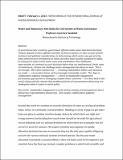Water and democracy: new roles for civil society in water governance
Author(s)
Susskind, Lawrence E.
DownloadWater and Democracy.pdf (172.5Kb)
OPEN_ACCESS_POLICY
Open Access Policy
Creative Commons Attribution-Noncommercial-Share Alike
Terms of use
Metadata
Show full item recordAbstract
In most democratic countries, government officials make water-allocation decisions. Citizens depend on these officials and their technical advisors to take account of both technical and political considerations in determining which water uses get priority, what infrastructure investments to make and what water quality standards to apply. In many parts of the world, water users and stakeholders have additional opportunities to comment on such decisions before they are implemented. Under some circumstances, citizens can challenge water management decisions in court. This is not enough. More direct democracy, involving stakeholders before such decisions are made, can produce fairer and increasingly sustainable results. The steps in collaborative adaptive management – a form of stakeholder engagement particularly appropriate to managing complex water networks – are described in this article along with the reasons that traditional forms of representative democracy are inadequate when it comes to water policy.
Date issued
2013-12Department
Massachusetts Institute of Technology. Department of Urban Studies and PlanningJournal
International Journal of Water Resources Development
Publisher
Taylor & Francis
Citation
Susskind, Lawrence. “Water and Democracy: New Roles for Civil Society in Water Governance.” International Journal of Water Resources Development 29, no. 4 (December 2013): 666–677.
Version: Author's final manuscript
ISSN
0790-0627
1360-0648